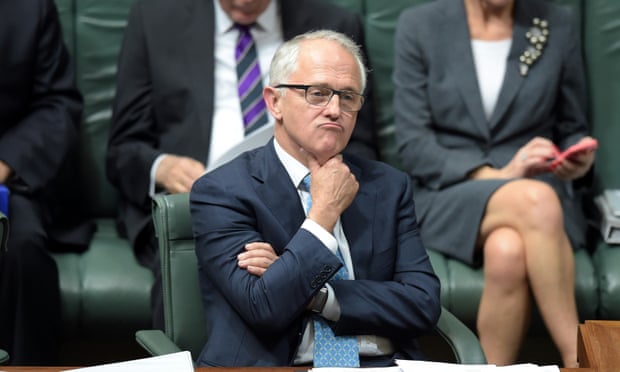Malcolm Turnbull once endorsed common sense positions on climate change. Then he became prime minister.
 |
| Australian Prime Minister Malcolm Turnbull reacts during House of Representatives Question Time at Parliament House in Canberra, Wednesday, Sept. 16, 2015. Photograph: Lukas Coch/AAP |
During the first few days of being prime minister, Malcolm Turnbull seems to be doing his best to argue about climate change with a former version of himself.
I know I might have already given the game away here, but who do you think said this only five years ago?
We are as humans conducting a massive science experiment with this planet. It’s the only planet we’ve got…. We know that the consequences of unchecked global warming would be catastrophic. We know that extreme weather events are occurring with greater and greater frequency and while it is never possible to point to one drought or one storm or one flood and say that particular incident is caused by global warming, we know that these trends are entirely consistent with the climate change forecasts with the climate models that the scientists are relying on…. We as a human species have a deep and abiding obligation to this planet and to the generations that will come after us.Stirring stuff eh?
That was Turnbull in August 2010, speaking at the launch of a report demonstrating the technical feasibility of moving Australia to a 100% renewable energy nation.
Malcolm Turnbull speaks in 2010 at the launch of a report explaining how Australia could be powered entirely by renewable energy, an idea he now seems to ridicule.
During his first question time as PM earlier this week, Turnbull was asked if he would join Labor in its aspiration (and that’s about the extent of Labor’s policy on this right now) that Australia should be generating 50% of its electricity from renewables by 2030.
Turnbull’s response?
[Opposition leader Bill Shorten] is highlighting one of the most reckless proposals the Labor party has made. Fancy proposing, without any idea of the cost of the abatement, the cost of proposing that 50% of energy had to come from renewables! What if that reduction in emissions you needed could come more cost-effectively from carbon storage, by planting trees, by soil carbon, by using gas, by using clean coal, by energy efficiency?What did the Turnbull of 2010 make of a plan to move away from fossil fuels that was twice as ambitious as Labor’s, that actually explained how it could be done and that proposed doing it faster?
Turnbull said that to “effectively combat climate change” the nation “must move… to a situation where all or almost all of our energy comes from zero or very near zero emissions sources”.
But now it seems, Turnbull wants to ridicule an idea that he enthusiastically supported five years earlier.
Turnbull once described the government’s Direct Action climate change policy as “fiscal recklessness on a grand scale” but now thinks the policy is a “resounding success”.
During his Question Time response, Turnbull also listed “clean coal” and “carbon capture” as viable responses to the problem.
Turnbull considered “clean coal” in his 2010 speech, but the Turnbull of old struck a sceptical tone, saying that “despite all of the money and all of the hope that has been put into carbon capture and storage there is still, as of today, not one industrial scale coal fired power station using carbon capture and storage”.
Since 2010, the coal industry has managed to get only one commercial CCS electricity plant up and running – SaskPower’s Boundary Dam project in Canada (the CO2 emissions from the plant are captured and sold to oil drillers to be pumped underground to push more crude to the surface, which seems to defeat the object of the exercise).
One clean coal plant in five years is apparently though, enough to assuage Turnbull’s scepticism that the coal industry’s perennial great hope had failed to materialise despite all the promises.
When it comes to reducing emissions, Turnbull has been consistent over the years in stating that it doesn’t matter how you cut emissions, just so long as you cut them.
But hearing his response to questions earlier this week, it appears that he is no longer willing to advocate a transition to renewables that he previously felt was essential.
Turnbull is obviously backing his government’s policy that buys emissions reductions, no matter where and how they are created.
But after you’ve spent $2.55bn of taxpayer money on projects to reduce emissions, you’re still left with the problem that you started out with. Too many energy providers relying on fossil fuels instead of renewables that load the atmosphere with carbon dioxide.
An approach like this is like putting the climate change cart before the fossil fuel horse.
In 2011, Turnbull said it was important that even within the debates between the merits of a carbon price or Direct Action, people should “not fall into the trap of abandoning the science.”
But now, Turnbull is defending his government’s weak targets on climate change that, if they were replicated by other countries around the world, analysts say would likely see the planet warm by 3C or more.
Not only is Turnbull abandoning the science, he is abandoning his previous common sense position on climate for what a former Turnbull described as a policy that was no more than fig leaf.
To quote Turnbull himself, building a future without a reliance on fossil fuels for energy is “absolutely essential if we are to leave a safe planet to our children and the generations that come after them”.

No comments :
Post a Comment